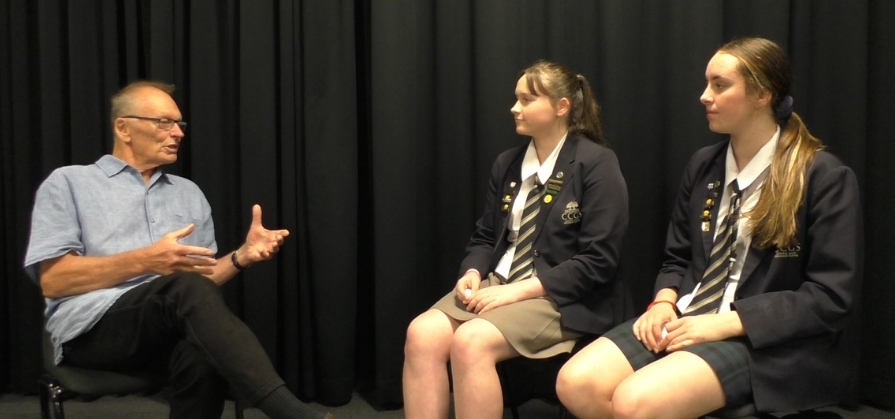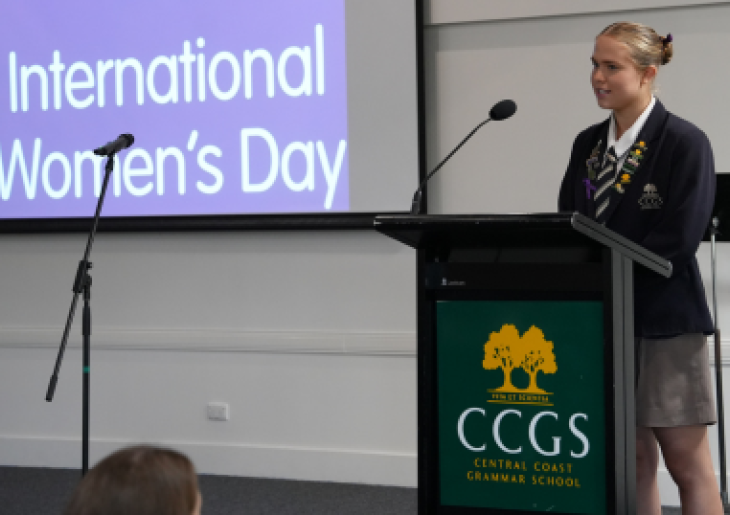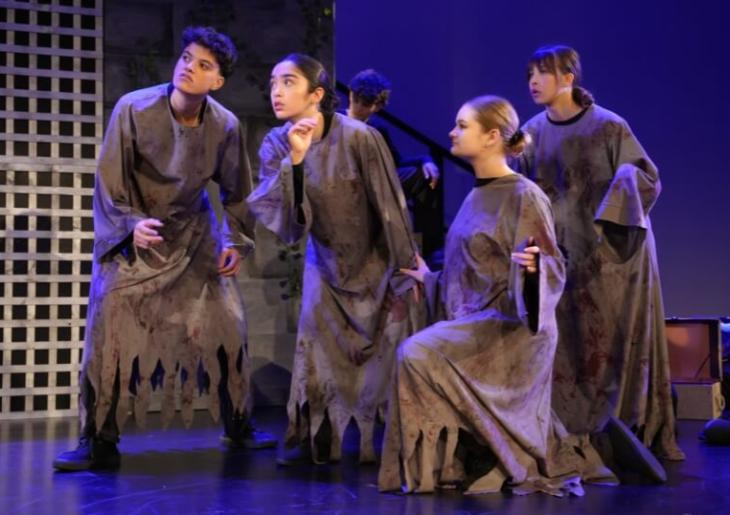Australian actor John Bell speaks to Drama Captains

John Bell AO, OBE, FRSN is an award winning actor and acclaimed director, co-founder of the Nimrod Theatre Company in Sydney in 1970. In 1990, he founded the Bell Shakespeare Company and was acting artistic director until 2015. CCGS Drama Captains, Abbey Healey and Danielle Stimson spoke directly with John during his visit to CCGS.
What was your initial inspiration to start Bell Shakespeare?
I grew up in Maitland, a country town. We had very little theatre. When live theatre came, everyone was so excited – the whole school would be marched off to see the show! Having live actors performing on stage was a great thrill. When I decided to start the Bell Shakespeare Company I wanted to make sure we reached out to regional Australia as well. Cities would get so much but country towns would get so little. I was determined that from day one the Bell Shakespeare Company would tour, not just country towns but regional outback areas as well. Now we perform in indigenous communities and juvenile justice centres so the outreach has been enormous. That is what I wanted – to make it accessible for everyone.
You have had roles as an actor, director, producer and a company founder if you had to choose, which would you prefer and why?
I’m going to be greedy and say all of them! They all give you something different. I started as an actor and then I wanted to direct and finally then produce and own my own company. I enjoy all of them for their own different responsibilities. When you are an actor you are in charge of your own performance. But when you are a director you are responsible for the whole thing. It’s a different kind of responsibility and different feedback you get. I’ve been very fortunate to have been able to do all those things.
What has been the most enjoyable role you have played throughout your years of acting?
I’ve done most of the big Shakespeare roles but I think I’ve enjoyed Richard III the most. I like the way he relates to the audience all through the play. He talks to the audience, gets them onside and there really is something very seductive about that. This character really gets under your skin. For all his villainy, he has a lot of charm, humour and playfulness. Plus he likes to shock audiences. And you get a bit of a buzz from shocking those who are watching you!
For your first acting role, you worked at the Old Tote Theatre Company. How was that experience for you as a young actor and what were some main things you learnt?
Going into the professional theatres I learnt a lot from watching the older actors. I would observe the way they behaved. They were always punctual, always knew their lines, respectful to the other performers and directors, how to sustain a performance over a long run. There were a couple of role models who I really looked up to and wanted to be like – both as a person and as an actor.
Who has been a great mentor in your life?
When I was at school watching actors the one who most influenced me and inspired me was Sir Laurence Olivier. I saw all his Shakespeare movies and that is what I wanted to do with my life. He was my first inspiration. When I was working in Sydney there was one actor, Ron Haddrick who died recently. He was someone who was my mentor and inspiration. He was a true gentleman, civilized and generous. When I joined the Royal Shakespeare Company, Paul Scofield was my most admired. I thought he was perhaps the greatest actor I had ever worked with. He became a role model, not just for his performance but the way he lived and behaved.
In 2003 you received the Dame Elisabeth Murdoch Cultural Leadership Award. What does leadership mean to you?
Leadership can mean so many things. To me it is about being there when you are needed, listen to everybody, seek advice from experts and collaborate with them on forging a plan or strategy, lead from the front as part of a team, be trustworthy and honest, fair-minded, give everyone a voice, and unite everyone in a common purpose.
How do you believe students today can become more engaged with Shakespeare’s texts?
I think the best way is to get up and perform it. Once you are up on your feet, moving into the space and connecting with people you can engage with the text much more. But you can’t really understand it until you've done your research so you truly understand what you are saying. I find though that my inspiration is getting up and doing it – that is when it really comes to life and how it was meant to be.
If you could offer the students here a word of advice regarding their future aspirations and careers, what would you say?
There’s a man called Joseph Campbell, he writes a lot of mythology. His catchphrase is ‘follow your bliss’. Whatever you are excited about, whatever you find fascinating or whatever you find inspiring, that is what you should go for. You must take the opportunity to express yourself and do what you want to do. Don’t let anything stop you.
Is there a quote from Shakespeare that resonates with you the most?
I’d say there are a couple:
In Hamlet when Orphelia says “Lord, we know what we are, but not what we may be”. We have huge potential and possibilities if we are brave enough to embrace them. We need to be brave enough to explore just how far we can go.
Casseus in Julius Ceasar says, “The fault, dear Brutus, is not in our stars / But in ourselves, that we are underlings.”
In other words – we are not prototypes, we are not subject to star signs or committal makeup. We are masters of our own fate; we create our own journey and we create our own opportunity.
Thank you John Bell for taking the time to speak with our students. It was truly an honour having you visit our school.




